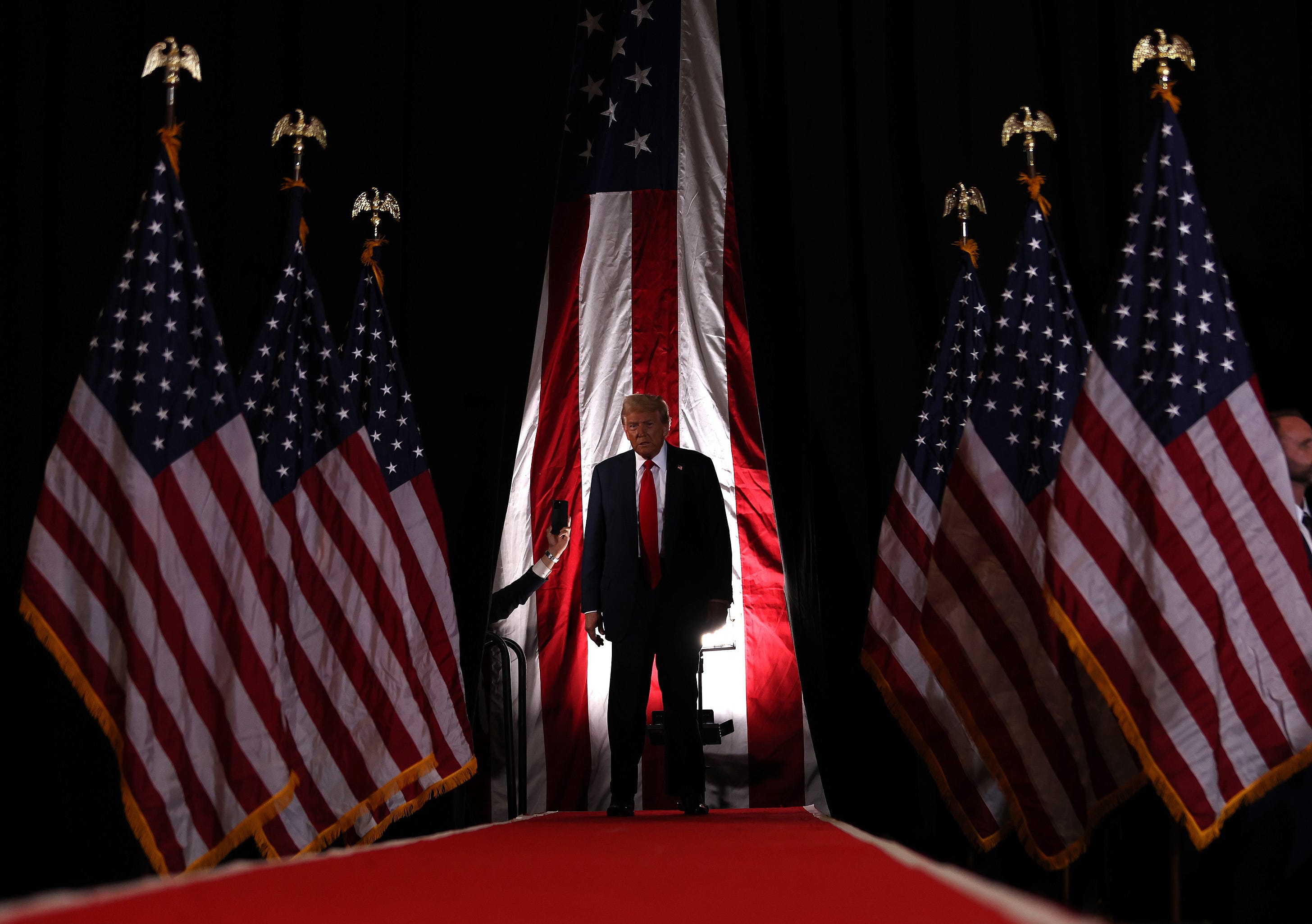Four years ago, Facebook (now Meta) suspended Trump indefinitely because he used those platforms to incite the mob at the Capitol. The suspension was lifted two years later. And now, Mark Zuckerberg, continuing his act of complete supplication to Trump, is hosting an inaugural ball for the soon-to-be president, and is set to attend the inauguration itself, while seated next to his fellow tech giants. When Zuck said he wanted to “move fast and break things,” we didn’t think he meant democracy. Speaking of which, we’re going to have a Bulwark Live breakdown of Attorney General-designate Pam Bondi’s nomination hearing later today. And in case you missed it, here’s our debrief of Pete Hegseth’s nomination hearing yesterday—exclusively for Bulwark+ members. Happy Wednesday. The Looming (Orange) Cloud AheadBill Kristol Yesterday, on January 14, 2025, the Biden era ended and the Trump era began. Not literally, of course. President Biden has five more days in office. But the release of Special Counsel Jack Smith’s report early Tuesday morning felt like the end of that chapter in our nation’s history. It’s a fine report. It’s a chronicle of an honest and determined effort to uphold the rule of law, and to hold accountable those who sought to subvert the peaceful transfer of political power. As I read the report, I felt a sense of respect, even admiration, for the intelligent and honorable public servants who tried to investigate honestly, who took the law seriously, and who sought to present the truth clearly. But my stronger sense was one of melancholy. The report was . . . a report. The effort to hold Donald Trump accountable for his lies, for his attempted usurpation of power, for his dereliction of duty, had failed. Trump wasn’t held accountable—by the Senate, by the Republican party, by the Biden administration, by the political or legal systems, or the establishment in general—or by the voters. The special counsel’s report was not only the swan song of the Biden administration. It also felt like the swan song of an era. That era perhaps began in 1974—after the turmoil of the 1960s, after the assassinations and Vietnam, after Watergate. The era began with Gerald Ford proclaiming that our long national nightmare was over. And in many ways it was. The fact is that we subsequently entered a pretty good stretch. It’s not fashionable today to say so. But I’d argue that the past half century, when compared with other 50-year stretches in American or world history, stands up well. Obviously progress is never linear or one-sided. Every achievement has its drawbacks, and every success leaves some problems unaddressed and creates others. Still, there was less war, more freedom, and greater prosperity. That’s not a bad record. And yes, I’m going to say this, against all the fashionable denigration of “mere” economic progress or technological advance or human freedom: The last half century has offered more opportunity for happiness for more people, at home and abroad, than ever before. So, even if—or especially if—no one else is doing it, I want to tip my hat to the era we’re departing. And while I’m at it, to the presidents of that era. They weren’t the greatest ever. But Gerald Ford, Jimmy Carter, Ronald Reagan, George H.W. Bush, Bill Clinton, George W. Bush, Barack Obama, Donald Trump (in his first term), Joe Biden: We could have done a lot worse. Trump was of course the harbinger of the end of that epoch and the coming of the next. But in his first term he was constrained, he was impeached (twice), and he was defeated. It didn’t seem out of the question in 2021 that perhaps the good times—at least the pretty good times—might resume; that we would rid ourselves of two viruses (COVID and Trumpism) and continue to move forward. Last November’s election put paid to all that. The coda to Trump’s victory was the special counsel’s report, which in fact explained that Trump’s electoral success had made further accountability from the legal system impossible. As the New York Times notes, citing the court rulings that derived from the special counsel’s legal battles, Smith “departs the most important prosecutorial job in the country over the past two years with the unintended consequence of giving Mr. Trump and every future president more, not less, freedom from legal constraints.” And if one felt a sense of melancholy reading that, a few hours later it was reinforced with the hearing of Trump’s nominee for secretary of defense before the Senate Armed Services Committee. The page had turned. We were in a new era, a new world, Trump’s world. There are excellent accounts of Pete Hegseth’s hearing on our home page, and I commend them to you. They watched so we didn’t have to. So I won’t dwell here on the sad spectacle of a manifestly unqualified nominee: a man of poor character, contemptuously and smugly evading reasonable questions as Republican senators accepted it all and praised his performance. And now it looks as if Hegseth’s confirmation is very likely. So, welcome to the new era. Welcome to the Trump era. Could it prove merely a four year interlude before a brighter future? It seems unlikely. After all, we as a country experienced Trump before and chose him again. But perhaps. Churchill said in November 1938 of Munich, despairingly but with a touch of hope: “This is only the first sip, the first foretaste of a bitter cup which will be proffered to us year by year, unless by a supreme recovery of moral health and martial vigour, we arise again and take our stand for freedom as in the olden time.” We too can hope to arise again. Doing so will require learning lessons from both the achievements and failures of the preceding era, and of its collapse. And it will require us to confront this new era with our eyes wide open, and with a sense of the magnitude of the task before us. Decline is a choice, Charles Krauthammer wrote. Watching the Hegseth hearing, I couldn’t help but think that, for now at least, we have chosen it. QUICK HITSWE ARE NOT FRIENDS BUT ENEMIES: Pete Hegseth talks a lot about war-fighting and lethality and focusing on the enemy—but who exactly does he think the enemy is? On the homepage today, Will Saletan breaks down a long history of Hegseth’s remarks and concludes that the enemy is not strictly foreign and the war is largely one of culture:
WHO AMONG US: One of the more memorable defenses of Pete Hegseth during yesterday’s hearing came from Sen. Markwayne Mullin, who asked, in essence, Who among us hasn’t cheated on our wife, and the wife after that, and the wife after that, mismanaged some money, shown up drunk to work, proved radically incompetent, failed to live up to the demands of our job, disappointed those around us, and engaged in a variety of other unscrupulous behaviors? Who are we to judge? And we have to say, as this line of argument applies to Republican senators, he has a point—just not one that is particularly glowing towards Hegseth. Over at Lawfare, Ben Wittes defines the new Trump era as one of “unqualified authenticity.” It’s true populism, in which having no qualifications for a position of power is the one qualification for holding it—as long as you’re “authentic.”
THE LAST DANCE: President Biden will deliver his farewell address tonight from the Oval Office. It is a fitting coda to a career defined by a mix of triumphs and tragedies, progress and setbacks. To start as New Castle County councilman and end up at the White House (after three failed attempts) is no small feat. But Biden has had remarkable achievements before. He was a 29-year-old senator-elect. He persevered through the death of his wife and daughter. He did so again after the death of his son. Even without the trappings of the Oval, his imprint on our politics has been remarkable. And yet, his legacy also includes stumbles. He was forced from one presidential bid by a plagiarism scandal. He rushed away from some of his seminal legislative achievements (supporting the Iraq War, ushering in the ‘94 crime bill). And his early triumphs in the White House (a massive economic recovery package and a successful management of the COVID pandemic) became liabilities. But what future generations remember may be that hubris got the best of him. Every politician believes they’re uniquely suited for power. And virtually every politician rejects the idea that they should give that power up willingly. But no politician has made as consequential a decision to hold on to power against clear signals that he should give it up. Biden has made thousands of critical calls over decades in elected office; many for the good. But that last one, which led to Trump’s second term in office, may be what he’s remembered for the most. SO. MANY. HEARINGS: We mentioned the Bondi hearing already. But just today there are five other confirmation hearings on the Hill: Marco Rubio for secretary of state, John Ratcliffe for CIA director, Chris Wright for secretary of energy, Sean Duffy for secretary of transportation, and Russell Vought for OMB director. Buckle up. CHEAP SHOTSYou’re a free subscriber to Bulwark+. For unfettered access to all our newsletters and ad-free and member-only podcasts, become a paying subscriber. Did you know? You can update your newsletter preferences as often as you like. To update the list of newsletter or alerts you received from The Bulwark, click here. |
We Had a Good 50-Year Run, Folks
January 15, 2025
0








